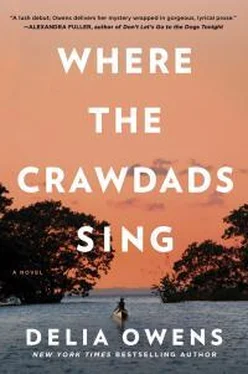Crushing shrubs and grasses, the boat broke its own trail across the marsh and then sped across the estuary. Herons and egrets squawking. Three men stood at its helm, and seeing Tate, they turned in his direction. As they neared, he recognized Sheriff Jackson, his deputy, and another man.
The flashy boat sat back on its haunches as it slowed and eased near. The sheriff shouted something to Tate, but even cupping his ears with his hands and leaning toward them, he couldn’t hear above the din. They maneuvered even closer until the boat wallowed next to Tate, sloshing water up his thighs. The sheriff leaned down, hollering.
Nearby, Kya had also heard the strange boat and, as she boated toward it, she saw it approaching Tate. She backed into a thicket and watched him take in the sheriff’s words, then stand very still, head lowered, shoulders sagging in surrender. Even from this distance she read despair in his posture. The sheriff shouted again, and Tate finally reached up and let the deputy pull him into the boat. The other man hopped into the water and climbed into Tate’s cruiser. Chin lowered, eyes downcast, Tate stood between the two uniformed men as they turned around and sped back through the marsh toward Barkley Cove, followed by the other man driving Tate’s boat.
Kya stared until both boats disappeared behind a point of eelgrass. Why had they apprehended Tate? Was it something to do with Chase’s death? Had they arrested him?
Agony ripped her. Finally, after a lifetime, she admitted it was the chance of seeing Tate, the hope of rounding a creek bend and watching him through reeds, that had pulled her into the marsh every day of her life since she was seven. She knew his favorite lagoons and paths through difficult quagmires; always following him at a safe distance. Sneaking about, stealing love. Never sharing it. You can’t get hurt when you love someone from the other side of an estuary. All the years she rejected him, she survived because he was somewhere in the marsh, waiting. But now perhaps he would no longer be there.
She stared at the fading noise of the strange boat. Jumpin’ knew everything—he’d know why the sheriff had taken Tate in and what she could do about it.
She pull-cranked her engine and sped through the marsh.
56. The Night Heron
1970
The Barkley Cove graveyard trailed off under tunnels of dark oaks. Spanish moss hung in long curtains, creating cavelike sanctuaries for old tombstones—the remains of a family here, a loner there, in no order at all. Fingers of gnarled roots had torn and twisted gravestones into hunched and nameless forms. Markers of death all weathered into nubbins by elements of life. In the distance, the sea and sky sang too bright for this serious ground.
Yesterday the cemetery moved with villagers, like constant ants, including all the fishermen and shopkeepers, who had come to bury Scupper. People clustered in awkward silence as Tate moved among familiar townspeople and unfamiliar relatives. Ever since the sheriff found him in the marsh to tell him his father had died, Tate simply stepped and acted as guided—a hand behind his back, a nudge to his side. He remembered none of it and walked back to the cemetery today to say good-bye.
During all those months, pining for Kya, then trying to visit her in jail, he’d spent almost no time with Scupper. Guilt and regret needed clawing away. Had he not been so obsessed with his own heart, perhaps he would have noticed his father’s was failing. Before her arrest, Kya had shown signs of coming back—gifting him a copy of her first book, coming onto his boat to look through the microscope, laughing at the hat toss—but once the trial began she had pulled away more than ever. Jail could do that to a person, he thought.
Even now, walking toward the new grave, carrying a brown plastic case, he found himself thinking more of Kya than of his dad and swore at that. He approached the fresh-scarred mound under the oaks, the wide sea beyond. The grave lay next to his mother’s; his sister’s on the far side, all enclosed in a small wall of rough stones and mortar embedded with shells. Enough space left for him. It didn’t feel as if his dad were here at all. “I should’ve had you cremated like Sam McGee,” Tate said, almost smiling. Then, looking over the ocean, he hoped Scupper had a boat wherever he was. A red boat.
He set the plastic case—a battery-operated record player—on the ground next to the grave and put a 78 on the turntable. The needle arm wobbled, then dropped, and Miliza Korjus’s silvery voice lifted over the trees. He sat between his mother’s grave and the flower-covered mound. Oddly, the sweet, freshly turned earth smelled more like a beginning than an end.
Talking out loud, head low, he asked his dad to forgive him for spending so much time away, and he knew Scupper did. Tate remembered his dad’s definition of a man: one who can cry freely, feel poetry and opera in his heart, and do whatever it takes to defend a woman. Scupper would have understood tracking love through mud. Tate sat there quite awhile, one hand on his mother, the other on his father.
Finally, he touched the grave one last time, walked back to his truck, and drove to his boat at the town wharf. He would go back to work, immerse himself in squirming life-forms. Several fishermen walked to him on the dock, and he stood awkwardly, accepting condolences just as awkward.
Head low, determined to leave before anyone else approached, he stepped onto the aft deck of his cabin cruiser. But before he sat behind the wheel, he saw a pale brown feather resting on the seat cushion. He knew right away it was the soft breast feather of a female night heron, a long-legged secretive creature who lives deep in the marsh, alone. Yet here it was too near the sea.
He looked around. No, she wouldn’t be here, not this close to town. He turned the key, churned south through the sea, and finally the marsh.
Going too fast in the channels, he brushed past low branches that slapped at the boat. The agitated wake sloshed against the bank as he pulled into her lagoon and tied his boat next to hers. Smoke rose from the shack’s chimney, billowing and free.
“Kya,” he yelled. “Kya!”
She opened the porch door and stepped under the oak. She was dressed in a long, white skirt and pale blue sweater—the colors of wings—hair falling about her shoulders.
He waited for her to walk to him, then took her shoulders and held her against his chest. Then pushed back.
“I love you, Kya, you know that. You’ve known it for a long time.”
“You left me like all the others,” she said.
“I will never leave you again.”
“I know,” she said.
“Kya, do you love me? You’ve never spoken those words to me.”
“I’ve always loved you. Even as a child—in a time I don’t remember—I already loved you.” She dipped her head.
“Look at me,” he said gently. She hesitated, face downcast. “Kya, I need to know that the running and hiding are over. That you can love without being afraid.”
She lifted her face and looked into his eyes, then led him through the woods to the oak grove, the place of the feathers.
57. The Firefly
They slept the first night on the beach, and he moved into the shack with her the next day. Packing and unpacking within a single tide. As sand creatures do.
As they walked along the tide line in late afternoon, he took her hand and looked at her. “Will you marry me, Kya?”
“We are married. Like the geese,” she said.
“Okay. I can live with that.”
Each morning they rose at dawn and, while Tate percolated coffee, Kya fried corn fritters in Ma’s old iron skillet—blackened and dented—or stirred grits and eggs as sunrise eased over the lagoon. The heron posing one-legged in the mist. They cruised estuaries, waded waterways, and slipped through narrow streams, collecting feathers and amoebas. In the evenings, they drifted in her old boat until sunset, then swam naked in moonlight or loved in beds of cool ferns.
Читать дальше











